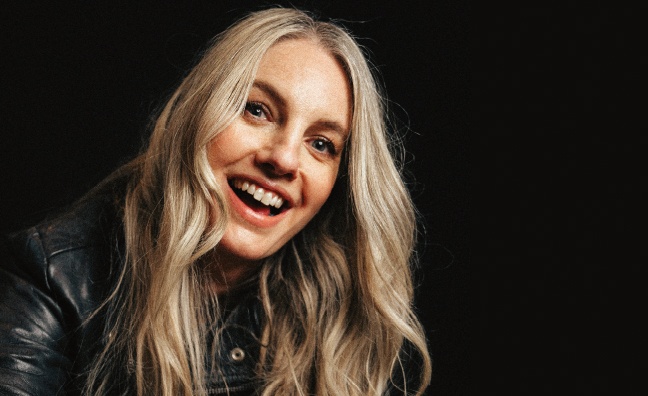Grammy Award-winning producer Catherine Marks has opened up on what the music business must do to support the studio creatives of tomorrow.
The Australian touches upon a myriad of topics including representation, conquering her fears and the late Steve Albini in the July edition of Music Week.
Marks, who tasted her first Grammy success earlier this year with Boygenius' debut album The Record (77,664 sales, OCC), reflected on how the wider industry could improve its treatment of producers.
“I think it’s about respecting the process," she said. "Traditionally, the producer’s role was there to help carry the burden - of the pressure, the finances, the budget, schedule - as well as facilitate for the artist to achieve whatever it is that they wanted to achieve.
"The roles outside the studio and the roles inside the studio are constantly evolving, so it’s about working together with the producers and the artists, and supporting them as they throw their blood, sweat and tears into something, and having a little bit of compassion...This is a very convoluted way of saying, ‘Just tell us we’re amazing.’ Because often, we’ll just need to hear it.”
Marks, who also took home the top accolade of Producer Of The Year from the Music Producers Guild Awards 2024 for her work on The Record, learned her craft as an engineer on records by acts including PJ Harvey, Foals and The Killers.
She has gone on to collaborate with the likes of Alanis Morissette, Wolf Alice, The Big Moon, Frank Carter & The Rattlesnakes and The Amazons, while her relationship with Boygenius has extended beyond the studio - joining the band on stage at Gunnersbury Park last summer to recreate the scream she recorded on the track $20.
I do understand that the conversation is important and always will be, because it appears as if there are not that many women in the industry
Catherine Marks
“That was the most terrifying experience of my life," Marks told Music Week. "I knew I had to say ‘yes’ when they asked me to do it because I was like, ‘This is an experience I can’t give up.’ But I’m pretty sure I was hyperventilating at the side of the stage before going on and then as soon as I walked out I think I blacked out.
"But then I just came to and I’m screaming and I see their three faces beaming back at me and I’m like, ‘Oh my God, this chorus is still going, I still have to carry on screaming.’ And then, once it was over, I realised no one cared and no one knew who I was. But it was fun for me to do. It’s good to put yourself in terrifying situations because once you’ve done it, it’s like, ‘Oh, I want to do that again.’”
Marks has spent much of her career advocating for better treatment and recognition of female producers.
"I do understand that the conversation is important and always will be, because it appears as if there are not that many women in the industry," she said. "And I understand that there are these percentage figures, but that [relates to] what is in the charts…
"I think there are a lot of people who are producing who might not necessarily be working on the kind of music that would chart. I know that I don’t all the time."
Marks namechecked Steph Marziano, Marta Salogni, Manon Grandjean, Jennifer Decilveo, Alex Hope and Laura Sisk as ones to watch in her field.
"There are a lot more of us than people seem to think," she added. "Also, what’s frustrating is politicising that, rather than celebrating the achievements of the women who are doing really well, to encourage the next generation. I wish there was more of that.”
Steve Albini was probably not awarded enough for his contribution to music, because he has made some of the most seminal and influential records of our time
Catherine Marks
Marks also paid tribute to legendary indie and alternative producer and musician Steve Albini, who died last month aged 61, and referenced the growing recognition of those in her profession by the media.
“[Steve] would be of the generation of producers, as were my mentors like Flood and Alan [Moulder], where it wasn’t about the producers, they wouldn’t do press," she noted. "Even when I first started back in 2005, it was really uncommon for a producer to do press. I remember Paul Epworth did a small interview in NME about working with The Futureheads. I was standing in the studio and other producers were going, ‘What does he think he’s doing? This is outrageous.’
"In my experience, the last 20 years have seen a lot more recognition from a press point of view of producers. That was definitely something that I wanted to push, because when I started in the industry it also coincided with streaming, budgets declining and schedules getting much smaller. As a result, we’re trying to give more importance back to the process of making records, to give value to that, so people could see that there was value in it.
"But to answer your question, Steve Albini was probably not awarded enough for his contribution to music, because he has made some of the most seminal and influential records of our time. I think he deserves a lot more recognition.”
Subscribers can read the full interview with Marks here.











